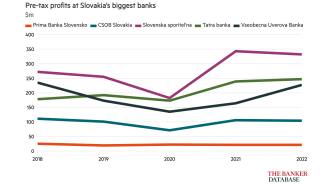Banks in Poland are braced for a wave of court cases and losses that could top €20bn in the worst-case scenario, following a ruling by the EU’s top court on the possible 'abusive' nature of Swiss franc mortgages. The ruling, and its fallout, is the latest stage in a long-running saga of foreign exchange lending in central and eastern Europe (CEE) that has led to billions of euros of losses and a range of political and judicial interventions.
More than 500,000 Polish households took out Swiss franc-linked loans in the years between Poland’s EU accession in 2004 and the 2008 global financial crisis, attracted by low interest rates – a pattern repeated across the CEE region. But the 2008 crunch saw a flight to safety that boosted the franc’s value, while emerging market currencies, including the Polish zloty and Hungarian forint, fell back. Suddenly, borrowers in CEE were left with mortgages that had soared in cost against their local-currency earnings. Some have campaigned to have their loans scrapped or converted.
The Swiss central bank’s decision to abandon its exchange rate ceiling against the euro in 2015 led to the franc jumping 30% against the single currency, and the Swiss currency has doubled in value against the zloty since 2008; at one point it had surged from less than two zloty to the franc to five. Polish banks hold €29bn-worth of foreign currency-denominated mortgages, €24bn of which are in Swiss francs – nearly one-third of the total, according to JPMorgan.
Local courts
On October 3, 2019, the Court of Justice of the EU (CJEU) ruled that Polish borrowers with Swiss franc mortgages could ask Polish courts to annul the loan contracts, or convert them into local currency. The decision gives domestic courts the scope to determine whether clauses in specific Swiss franc mortgage contracts are 'abusive'. But the ruling left questions open: it will be up to those Polish courts to interpret what constitutes 'abusive' terms, and recognises several potential legal responses.
These include annulment – which could also have a negative impact on the borrower – and conversion to zloty at historical or current interest rates, as well as possible compensation for past overpayments. It is also unclear whether rulings will apply to franc-indexed mortgages, or just franc-denominated ones.
“It is important to indicate that the CJEU was not deciding on the abusiveness of foreign currency loans as such,” says Włodzimierz Kiciński, vice-president of the Polish Bank Association (ZBP). “Consequently, the CJEU judgment did not clarify all the doubts present in the Polish case law; any potential disputes between banks and their customers concerning Swiss franc loans will have to be resolved by the Polish courts on a case-by-case basis.”
While borrowers’ groups celebrated the outcome, the market reaction has generally been sanguine, with one index of bank stocks dropping just 1.1% on the decision and some stocks have since trended upwards.
The ZBP is confident that courts will “find a wise and rational solution” to the cases, and aim to maintain “the stability of the Polish economy and financial system and take into consideration the basic principles of legal order”.
Banking costs
Mr Kiciński warns that if a significant volume of cases goes forward, there will be “additional costs” for the banking sector, but says he does not expect a very large number of claims due to the risk to borrowers that annulment would entitle the bank to claim remuneration for the borrower’s use of the capital it provided.
“If you strike down the 'abusive' clauses, the contract as a whole may not be properly functioning, and that means that it is void, which would mean that you immediately had to pay up the full loan,” says Jarosław Bełdowski, senior advisor at CEC Government Relations, a regional public affairs company.
Only about 2% of Swiss franc mortgage holders have gone to court thus far, according to Lucyna Stańczak-Wuczyńska, EU banks director at the European Bank for Reconstruction and Development. But this number is likely to increase following the CJEU ruling, particularly if the success rate of borrower’s court claims rises – as seems to be happening.
Ms Stańczak-Wuczyńska adds that Poland's banks are already increasing their provisioning for increasing claims. Yet the process is lengthy and “there is a quite unanimous voice that the impact is as yet impossible to manage or quantify”.
“In the first instance, the clients are winning at a rate of 80%,” says Rafał Benecki, chief economist at ING Bank Śląski. “But in the final verdicts, the percentage of clients winning is not that high yet, and probably that affects the number of clients applying.
“If a clear prevailing approach from the courts emerges, maybe new cases will speed up, and that would be a possible trigger for zloty weakness and worries about bank profitability.”
Auditor response
One of the biggest questions is how auditors will respond to rising claims. Thus far banks have provisioned on a case-by-case basis. But JPMorgan judges it likely that auditors will soon push for provisioning on whole sections of banks’ loan books considered risky, which Mr Benecki says is an outcome that risks freezing up credit flows and could have an impact on gross domestic product growth – “it is in no-one’s interest”.
In a note published on November 4, JPMorgan estimated that if only 50% of Swiss franc-indexed mortgages are successfully challenged, and the banks are able to spread the cost over three years, the overall annual loss would be €2.4bn, with the zloty seeing €2.6bn of outflows.
However, if banks are forced to convert Swiss franc loans at a historical rate, with compensation for excessive payments, losses could total €10.4bn to €15.6bn depending on whether only Swiss franc-linked or all franc loans are included. In the worst-case scenario, in which loans are annulled, JPMorgan estimates that total bank losses would range between €14.3bn and €21.5bn.
The report cautioned that the muted market reaction to the CJEU ruling overlooks serious downside risks. With a presidential election looming in May 2020, there is a chance that candidates will campaign for a 'systemic' approach to the foreign exchange loan issue. Indeed, Polish president Andrzej Duda previously proposed converting the loans to zloty. However, if banks come under pressure from a wave of mortgage repayments, the government may consider easing its controversial banking tax.
Caution vindicated
The banks that mostly steered clear of Swiss franc lending are following developments with a feeling of some vindication. “We had many questions about why we weren’t lending in Swiss francs, we were told we’d lose a large market share,” says Mr Benecki. “We had an explanatory sentence: if you want to bet on foreign exchange, don’t use your house as collateral. People thought it would be different, the zloty was appreciating after Poland joined the EU. But then we had Lehman Brothers, and a change of paradigm.”
Most likely to feel the pain is a handful of mid-sized banks. Millennium, Getin Noble and mBank, which together have 15% of total system assets hold 60% of Swiss franc-indexed mortgages, according to JPMorgan. Such loans account for about 21% of Getin’s gross loan book, for example. Getin declined to comment.
Krzysztof Olszewski, mBank spokesman, says: “Whether the case law of the Polish court follows the CJEU judgment will become clear in a few years; mBank will monitor these issues in subsequent periods and will appropriately take into account the potential impact of changes in court rulings.”
As elsewhere in the region, some banks are paying the price of their expansion strategy during the boom years.
“The dominant view is that some time ago, some mid-sized banks decided to grab a larger market share, and went into the foreign exchange loans market because of this,” says Mr Bełdowski. “But the issue is that it also made them more vulnerable. The ruling won't make a huge impact on big banks because they are quite healthy and well managed. For mid-sized ones there could be more problems.”
Regional story
How the CJEU ruling plays out in Poland will be the latest stage in the ongoing story of foreign exchange lending in the CEE region, a decade after the global economic crisis. Hungary pushed its banks to convert outstanding Swiss franc mortgages into Hungarian forints at a fixed exchange rate in 2014, which cost €2bn to €3bn. Croatia’s government retroactively converted Swiss franc-pegged loans in 2015, though a September 2019 Supreme Court decision has opened the door to thousands of lawsuits against banks who extended Swiss franc loans.
“Governments were generally too afraid of international investors and didn’t address the foreign exchange lending issue through the executive branch of government – except in Hungary, where otherwise there would have been a financial crisis,” says Mr Bełdowski. “But consumers have been helped by courts, with the CJEU ruling and Croatia's Supreme Court.”












